|
1.
CENTRAL/ WEST AFRICA
Far Eastern and French demand supports price rises
Log prices held very firm through the end of March. Recent favourites, moabi and movingui, have had further
price increases due to strong demand from both Far East and France. Supply is reportedly relatively difficult, a
factor that adds to the competition for the moderate volumes available. In contrast, demand for okan logs has
moderated with less interest from buyers from China, though prices have remained unchanged in spite of higher
stock in ports.
Chinese demand for okoume logs continues strong though prices are unchanged, while some of the less popular log
species, that have had a good run in the past year or so, are now seeing somewhat lower interest overall from buyers.
Niove, afo and bomanga are said to be in less demand through March, though prices have not been affected.
Price stability is expected to hold through the second
quarter as both China and India remain active buyers with European importers having to compete for limited supplies
of their particular favourite species. Meanwhile, there is still no firm news about the date for the full
implementation of Gabon¡¯s log quota scheme.
Sawnwood prices mirror log market situation
Most sawn lumber prices remained also relatively unchanged through the end of March, though, as with logs,
prices for moabi and movingui sawnwood have put on quite noticeable gains due to higher demand from Europe
coupled with the lower supply situation. Prices for moabi FAS GMS rose euro55 to euro615 per m3 while those for
scantlings went up euro45 to euro625 per m3. Prices for
movingui FAS GMS rose euro18 to euro460 per m3. Prices for padouk FAS GMS also rose euro50 to euro590 per m3 while
fixed sizes and scantlings edged up euro40 to euro600 per m3 fob. Demand from South Africa for okoume sawn lumber
is firm and traded volumes increasing, with importers indicating substantially higher requirements for the near
future. Sawn lumber supply of sapelli, sipo and makore is reported as below market demand, with mills in Congo the
main suppliers.
Congo¡¯s new reforms to boost conservation efforts
The new government of the Democratic Republic of Congo (DRC) has committed to a package of reforms to
boost the country¡¯s emerging conservation efforts. The announcement was made by the Environment Minister,
Didace Pembe Bokiaga, at the ¡ˇăInternational Conference on Sustainable Management of Forests¡ˇŔ held recently in
Brussels. Armand de Decker, Belgian Minister of Development Cooperation and conference host, pointed
out that saving the Congolese forest contributed to poverty reduction and protecting humanity¡¯s ecological heritage.
There were consensus on DRC¡¯s critical governance reforms, including maintaining the moratorium on new
logging, launching a legal review of existing concessions and providing legal recognition for the rights of
indigenous peoples. There were calls for new financing mechanisms to boost conservation, including payment for
carbon sequestration and biodiversity protection.
The World Bank released a joint publication entitled ¡ˇăForests in Post-Conflict Democratic Republic of Congo:Analysis of a Priority Agenda¡ˇŔ at the conference.
According to the publication, hard-won peace and unplanned roads can lead to chaotic development, further
exacerbating pressure on forests. In the past five years, however, Congo basin countries have created over 6
million ha of new protected areas. According to the World Bank, sustainable forest management is advancing faster
in the Congo basin than in any other tropical region.
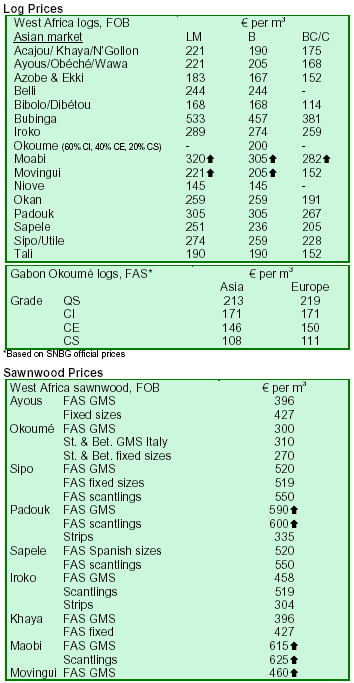
2. GHANA
Ghana appoints new head of Forestry Commission
Dr. Nii Ashie Kotey, a professor of Law, has been appointed as the new CEO of the Forestry Commission
(FC) of Ghana by President John Agyekum Kufuor, on the advice of the FC and in consultation with the Public
Services Commission. Dr. Kotey is a specialist in forestry, natural resources and environmental law and for 20 years
have been consultant in the area of forest policy, law and management. Until recently, Dr. Alhassan N Attah was
the acting CEO of the FC following the retirement of Mr. John Otoo. Timber producers, particularly from the Western Region, have
hailed the appointment and suggested that his administration prioritized the
re-afforestation programme to sustain the timber industry.
Ghana and EU hold first VPA meeting
The Lands, Forestry and Mines Ministry, Professor Dominic Fobih, said Ghana was determined to protect the
nation's forest and its resources, at the first Ghana-EU meeting on voluntary partnership agreement (VPA) in
Accra. He said the forestry sector played a significant role in the country and needed to be preserved from illegal
chain saw operators. He said the sector has been engaged
in a steady move towards improving good governance. The meeting, among other things, was to agree on terms
and conditions at which lumbers were being exported from Ghana to the EU markets. EU delegates indicated that
some lumbers exported to the European market were not
properly harvested and had cracks. Once concluded, the agreement will bind both parties to ensure that only legally
or properly harvested timber will be exported to the EU market.
Luis Riera, Director of the European Commission and leader of the delegation, said the EU was the largest
importer of Ghana's timber products and was determined to assist the country in managing its forest and to ensure
that all the timber exports originated from a legal and sustainable source. He recognised the efforts made by
Ghana in reforming its forestry sector and implementing sustainable forest management.
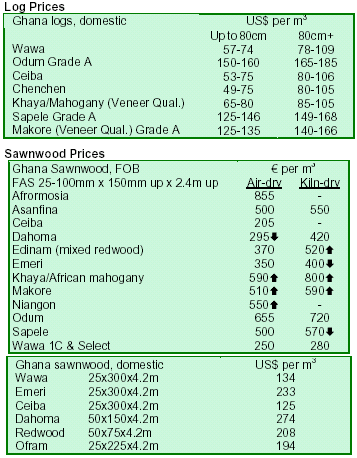
3.
MALAYSIA
Government takes steps to alleviate supply shortages
The Malaysian Plantation Industries and Commodities Minister, Datuk Peter Chin Fah Kui, said that the
Malaysian government was taking serious actions to increase the supply of timber in order to meet the demand
of the export sector. It has identified 16,000 ha in the states of Sarawak, Pahang, Selangor and Kelantan for a
sustainable forest plantation programme. Six local companies have been given soft loans to participate in this
programme. Manufacturers of timber products in Malaysia, especially those in Peninsular Malaysia, are
facing a chronic long-term raw material supply problem.
Malaysia-EU kick off second round of negotiations
Malaysia and the EU will hold the second round of negotiations in Brussels in April, under the Forest Law
Enforcement, Governance and Trade (FLEGT) voluntary partnership agreement, to resolve outstanding issues. The
agreement will verify the legality of Malaysia timber exports to the EU countries by setting up the legal
framework and related protocols to combat and to eradicate illegal logging from the supply chain. It will
also intend to enhance long-term trade and improve
transparency and governance in the forestry sector.
Sabah exports biotech teak plantlets to the world
The state of Sabah in East Malaysia is pursuing biotechnology to cultivate teak to meet global demand for
this species. The state-owned Plant Biotechnology Laboratory (PBL), which operates under the registered
company YSG Biotech Sdn. Bhd., has a new 2,000 m2 facility, with a production capacity of up to 1 million
plantlets per year. To date, PBL has received 1 million
orders for its teak planting material. The company exports planting materials mainly to Australia, Brazil, Guatemala,
Panama, Costa Rica, Indonesia and Tanzania, among others.
APP Timber reports increased imports in Southeast Asia
APP Timber, a Dutch company based in Malaysia and specialized in the import of sawnwood and veneer for the
Asian timber industry, reported a 25% growth in business in 2006, with a total trading volume of $22.4 million.
According to APP Timber, it is the largest Southeast Asian based provider of imported sawn timber and veneer into
Asia. The company expects the trading volume to grow at
least another 25% this year due to increased marketing operations in Asia. It promotes various plantation species
as substitutes for rubberwood, such as radiata pine and Scandinavian pine/spruce, as well as many temperate
species from Europe, the USA and Africa. Besides
Malaysia, APP Timber has operations in Thailand, Indonesia, Vietnam and China. A significant volume of
the timber products are FSC certified.
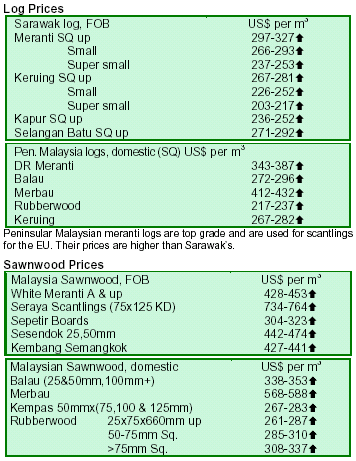
4.
INDONESIA
Dutch builders pledge to use certified Kalimantan timber
Dutch builders announced that they will only purchase Indonesian timber products certified to be legally
harvested and from forests managed sustainably. The announcement came about after a four-day conference
between Dutch buyers and Indonesian suppliers of wooden products certified by FSC in Jakarta. The Dutch Housing
and Construction Association plans to build 100,000 houses in the Netherlands over the next five years using
certified timber from Kalimantan. Jesse Kuijper, chairman of FSC Netherlands, said that each house, while under
construction, needed about 1 m3 of sawn timber and 4 m3 of other timber products. The amounts are expected to
increase over the years. The conference also discussed issues and challenges in the application of the FSC
certification mechanism.
PP seeks funds for 200,000 ha reforestation project
The state forestry company, Perum Perhutani, has prepared around 400 million young plants to reforestate at
least 200,000 ha in Indonesia this year, according to its president, Trastoto
Handadari. The company is seeking sponsors to support the funding of the project. The project
would require up to one million forestry workers. Perum Perhutani has also developed other
projects, such as forestry education and eco-tourism programmes in the framework of the
reforestation drive until year 2010.
Furniture industry may head streamlining path
The Indonesian furniture industry is bracing itself in the wake of the US housing downturn. The USA is the largest
export market for the Indonesian furniture. Faced with rising raw material costs due to competition from the
paper and pulp industry for forest concessions, the Indonesian furniture may be heading down the same path of consolidation taken by the Indonesian plywood
industry, where smaller and less efficient companies closed down in favour of proficient and resource rich
companies.
Indonesia unveils bill to lure investment in forestry sector
Members of the House of Representatives have agreed with the government to bring a bill on capital investment
to the full House. The Trade Minister, Mari Elka Pangestu, unveiled the bill as part of a package of legislation
expected to attract more foreign investors to Indonesia. The bill stipulates that foreign investors can obtain 95-year
land cultivation rights, 80-year building rights and 70-year
land usage rights, factors that are important to foreign investors in the forestry and plantation sectors.
Meanwhile, the Asian Development Bank (ADB) indicated that federal government expenditures and
investments would boost Indonesia¡¯s economic growth to 6% in 2007 and 6.3% in 2008. Edgar A Cua, ADB
representative in Indonesia, added that a lowering of bank interest rates would help to fuel investment and
consumption growth.
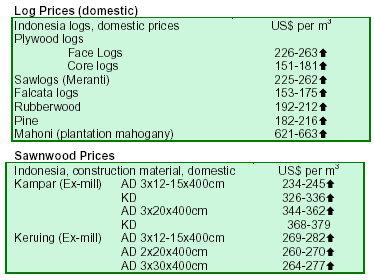
5.
MYANMAR
MTE raises direct saled teak prices
The Myanma Timber Enterprise released new direct sales prices for teak and other hardwood logs on 19 March
2007, superseding those of 10 February 2006. In average, prices were 6% higher for sawing quality 4 (SG4), 12% up
for SG5 and 14% up for SG6 teak logs. Prices for gurjan (keruing) logs surged 10% while those for pyinkado and
padauk remained unchanged.
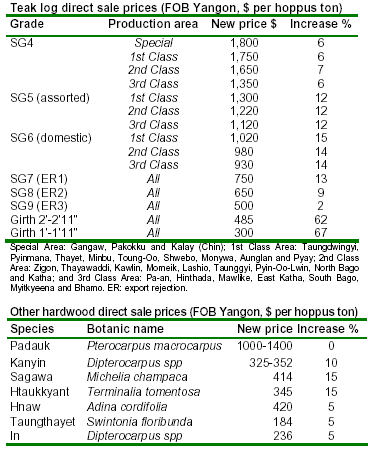
Teak tender prices rise across the board
Tender sales were 1,351 hoppus tons while sealed tender sales were 1,025 tons in March 2007. Buyers seeking
better grade teak logs can only buy them at the tender sales as there are no direct sales for 2nd, 3rd, 4th, SG1 and SG2
teak grades. Teak grades in the sealed tender sales can also
be purchased in direct sales, which amount to about 200,000 h. tons annually, as compared with 35,000 h. tons
in tender and sealed tender sales.
Average prices for all teak grades rose across the board in March. The quality of the logs was particularly good in the
March tenders while there were limited teak cargoes available in Yangon. Another factor driving prices up was
the recent raise of MTE prices for direct sales contracts of
teak and other hardwoods on 19 March (see above). Moreover, the European market is reportedly strong, with
a good demand for veneer logs. Teak stocks in Europe are declining while sawn teak prices are surging. Average
prices for SG4 grade climbed nearly .270 per hoppus ton while prices for SG7 were higher than in February but
lower than in January. Some SG4 lots contained downgraded SG2 logs which caused these lots to fetch
higher tender prices than average SG2 lots.
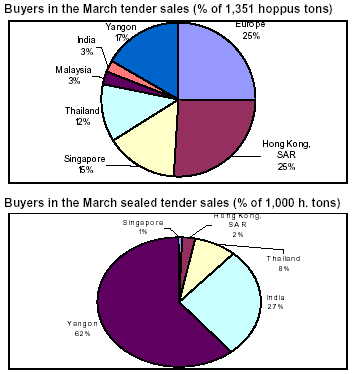
The charts above show amounts purchased by buyers from
designated areas in the last tender and sealed tender sales, which are not necessarily actual importing countries. Lots
are purchased in tenders and re-sold to buyers in other countries such as Japan, Pakistan, India and China.
Market closes 10 days for New Year celebrations
In contrast to March, the market is expected to be much less active in April. The Myanmar
government will officially close offices for 10 days during the Myanmar New Year. Excluding
weekends, not much business activity is expected to be carried out in the remaining 12 work days of the month.
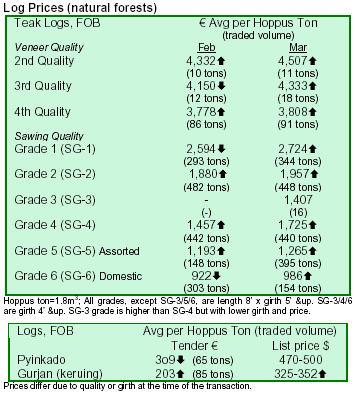
6. PAPUA
NEW GUINEA
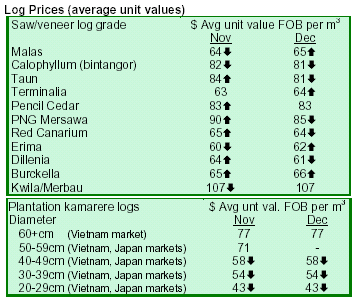
7. BRAZIL
Domestic prices rise as Brazilian real further strengthens
Export prices for Brazilian wood products remained stable in March. In contrast, domestic prices rose 1.9% in
average due to a further appreciation of the Brazilian real against the US dollar during the period.
Brazil partially reverses forest loss with plantations
A recent FAO report showed that Brazil accounted for 73% (31,000 km2 per year) of the
deforestation of natural forests in South America (42,000 km2 per year) in 2000-2005 (see TTM 12:5). However, FAO emphasised
that Brazil could swiftly change the situation thanks to the
success of commercial forest plantations in the country. With about 5.6 million ha of forest plantations, Brazil is
amongst the world¡¯s most advanced countries in technology for the establishment of planted forests.
Timber from forest plantations have been extensively been
used by sectors such as pulp & paper, solid-wood products (including lumber and plywood) and reconstituted
wood-panels.
Brazil hits a new record in annual forest plantations
A survey by the Brazilian Forest Service and the Secretariat of Biodiversity and Forests of the Ministry of
Environment showed that Brazilian forest producers and companies planted 627,000 ha of industrial forest
plantations in 2006, up 13% from 2005 and a new record.
In the North region, Parˇ§¢ was the state that planted the most with 13,000 ha. According to Ibama, the planting
area in the state is over three million trees, mostly with Parica (Schizolobium
amazonicum), a relatively fast-growing native species used by tropical plywood and
veneer companies. The forest plantation area in Parˇ§¢ is estimated at 50,000 ha and expanding
increasingly, but still insufficient to meet the timber demand from the forest
industry. The Environment State Secretary and Ibama have stimulated wood-consuming sectors such as the
pig-iron industry to expand their industrial forest plantation area in order to comply with the
environment legislation that mandate to prove sustainable timber production.
Family agriculture has also contributed to the growth of forest plantations nationwide in 2006. The participation of
small and medium-size forest producers in the activity has grown. Between 2002 and 2006, the total planted forest
area by these landowners grew at the outstanding rate of 616%.
Paranˇ§¢ firms partner with Chinese to gain competitiveness
Chinese competition has forced forest-based companies in Paranˇ§¢ to transform rivals into partners. Increasingly more
firms seek partnerships with Chinese producers to take advantage of low costs and high productive capacity. With
a minimum wage of around $60 (half of the Brazilian wage), high productivity and massive manpower migrating
from rural to urban areas, China has become a business opportunity. This is the view of the Federation System of
Paranˇ§¢ State Industries (FIEP), an institution that drive at least five annual Brazilian enterprise missions to China.
A recent study by the National Industry Confederation (CNI) shows that 12% of large Brazilian companies have
already transferred part of its production to China, either by installing own plants or contracting part of the
production. Even some small and medium-sized companies have also taken steps in shifting production to
China. An example is a Paranˇ§¢ manufacturer of fine lumber who found in China a way to reduce production
costs. The company exports dry lumber boards to China,
where Chinese workers make the finishing for wood flooring or laminated flooring. The company¡¯s office in
the USA purchases back the wood flooring and sells it with its brand name. The partnership has been in force for
three years now and enabled the Paranˇ§¢ manufacturer to add a new product to its portfolio abroad.
Supply of elliotis pine ply hampered by shipment delays
Prices for Brazilian elliotis pine plywood have surged in recent weeks due to delays in shipments, Euwid reported.
According to some traders, the overall availability of elliotis pine plywood has rather deteriorated in the last few
weeks on the back of seasonal limitations to log supply, continued production cutbacks and delays in shipments.
This development has affected the availability of elliotis pine plywood panels of less than 15mm and of more than
24mm, in particular.
Recent delays in shipments are due to a increasingly shortage in containers and shipping space, resulting from
seasonal fruit shipments to Europe. Moreover, isolated short strikes have taken place in the softwood plywood
exporting ports of Parangua, Itajai and San Francico do Sul, slowing further down exports. Meanwhile, purchases
against the EU softwood plywood duty free quota have been comparatively consistent in the last few weeks. The
quota is expected to be exhausted in May as in the previous two years.

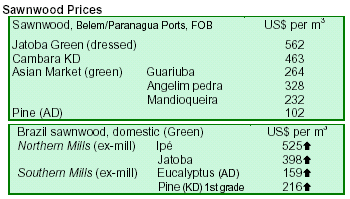
8. PERU
Inrena transfers key duties to regional governments
In accordance with the Plan of Decentralization of Sector Competences to Regional Governments, the Ministry of
Agriculture has issued the Supreme Decree No.011-2007-AG, approving the transference of two main
duties of the National institute of Natural Resources (Inrena) to regional governments, namely:
To develop surveillance and control actions to ensure the sustainable use of natural resources under its
jurisdiction;
To grant permissions, authorizations and forest concessions in areas within the region, as well as to
develop promotion and inspection tasks in strict compliance with the national forest policy.
According to Ivan Vasquez, president of the Loreto regional government, Loreto is in capacity to increase
fourfold its exports in four years time, rising from $24.5 million to no less than $250 million and benefiting the
Loreto region economy. On the other hand, the decree points out that the distribution of harvesting rights in forest
concessions for the production of wood based products
will be as follows:
60% to the regional government, of which a part will cover the promotion of forest management committees;
30% to Inrena;
10% to the Forest Concessions Supervision Office (OSINFOR).
Inrena reduces logging quota for mahogany
Inrena agreed to reduce the mahogany¡¯s logging quota for 2007 in order to protect the species from extinction,
according to its Director, Roberto Angeles Lazo. The quota has been reduced from 23,239.6 m3 in 2006 (see
TTM 11:2) to 16,000 m3 in 2007. According to Mr. Angeles, mahogany is the most valuable forest species and Peru has one of the highest production volumes.
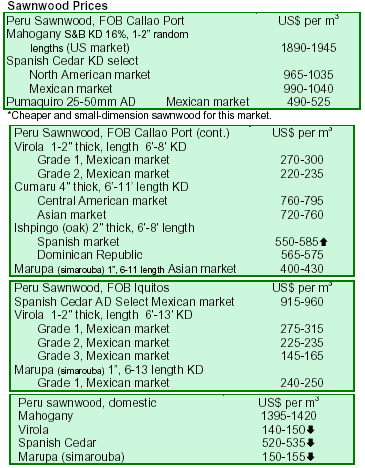
9. BOLIVIA

10. Guatemala

12.
Guyana
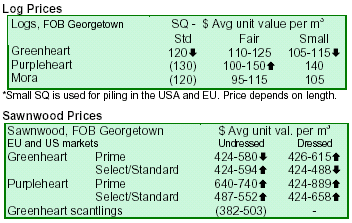
|